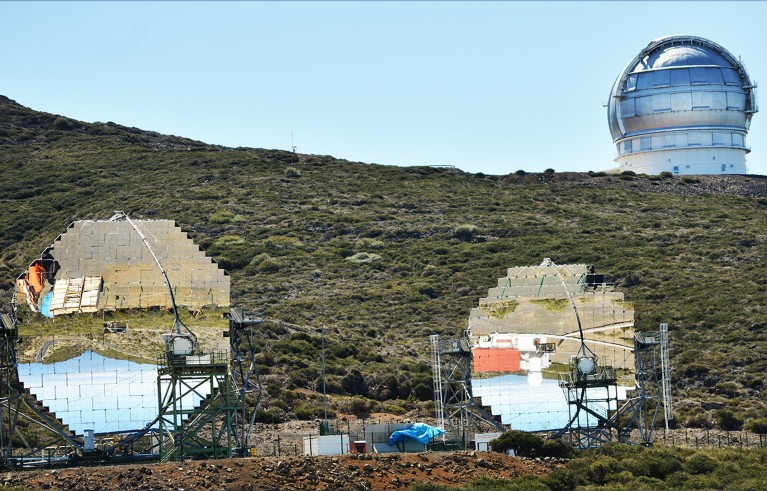You have full access to this article via your institution.
Hello Nature readers, would you like to get this Briefing in your inbox free every day? Sign up here.

The Thirty Meter Telescope could join the already crowded mountaintop at the Roque de los Muchachos Observatory on La Palma island.Credit: Klaus Rose/ullstein bild via Getty
The Thirty Meter Telescope, a major international project long slated for construction in Hawaii, might be getting a new home. The Spanish government has pitched to bring the giant facility to La Palma, in Spain’s Canary Islands — and backed up the effort with a pledge to contribute €400 million. The move comes after US president Donald Trump’s administration announced plans to abandon further support for the telescope, which had been expecting funding from the US National Science Foundation.
Magellanic penguins (Spheniscus magellanicus) are masters of energy efficiency: instead of taking a straight-line route to their destination, they’ll ride curved currents that are headed roughly in that direction when possible. The currents can make their trips slightly longer, but that has an upside — it allows them more time to hunt for food. Researchers found that by using currents, the penguins consistently returned to within 300 metres of their homes. The findings suggest that the birds keep track of the changing tidal cycle and use it to their advantage.
Reference: PLOS Biology paper
Artificial intelligence (AI) tools developed by Google DeepMind and OpenAI have cracked a set of maths problems at the level of the world’s top high-school students, achieving a gold-medal score on questions from the International Mathematical Olympiad. DeepMind models have previously reached silver-medal level, but these tools required human experts to first translate the problems’ statements into something similar to a programming language, and then to translate the AI’s solutions back into English. The tool they used this year is “natural language, end to end”, says DeepMind computer scientist Thang Luong.
Representatives from the old and new world meet to discuss the end of the world in the latest short story for Nature’s Futures series.
Using a giant laser, researchers ‘superheated’ a thin strip of gold well beyond its melting point without it becoming a liquid. The team suggests that the speed at which they heated the gold allowed them to shoot past this limit, but there is scepticism about whether they actually achieved the level of heating they report. Luckily, it could be relatively easy to clear up any doubts. “This is something that we can exactly model in a computer, because it’s such a well-defined problem,” says computational physicist Artur Tamm, who reviewed the paper.
Nature Podcast | 35 min listen
Subscribe to the Nature Podcast on Apple Podcasts, Spotify or YouTube Music, or use the RSS feed.
Today Leif Penguinson is marvelling at the beauty of the Huilo-Huilo Biological Reserve in southern Chile. Can you find the penguin?
The answer will be in Monday’s e-mail, all thanks to Briefing photo editor and penguin wrangler Tom Houghton.
This newsletter is always evolving — tell us what you think! Please send your feedback to [email protected].
Thanks for reading,
Jacob Smith, associate editor, Nature Briefing
• Nature Briefing: Careers — insights, advice and award-winning journalism to help you optimize your working life
• Nature Briefing: Microbiology — the most abundant living entities on our planet — microorganisms — and the role they play in health, the environment and food systems
• Nature Briefing: Anthropocene — climate change, biodiversity, sustainability and geoengineering
• Nature Briefing: AI & Robotics — 100% written by humans, of course
• Nature Briefing: Cancer — a weekly newsletter written with cancer researchers in mind
• Nature Briefing: Translational Research — covers biotechnology, drug discovery and pharma



